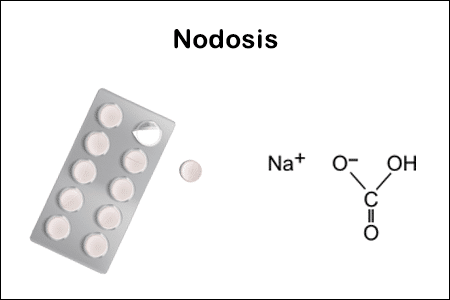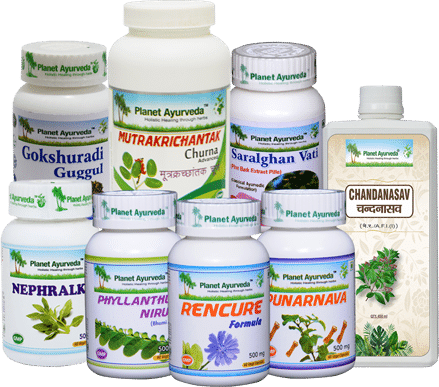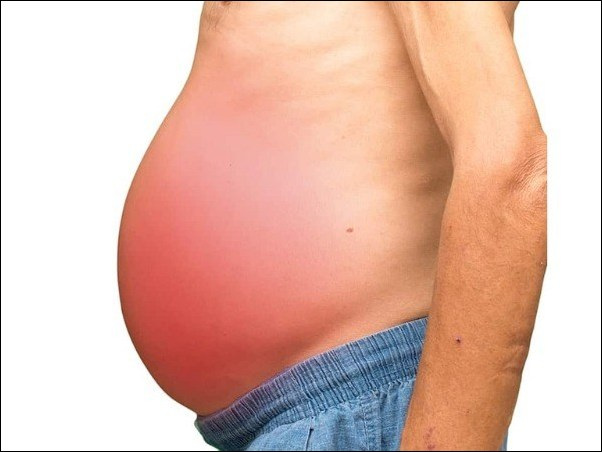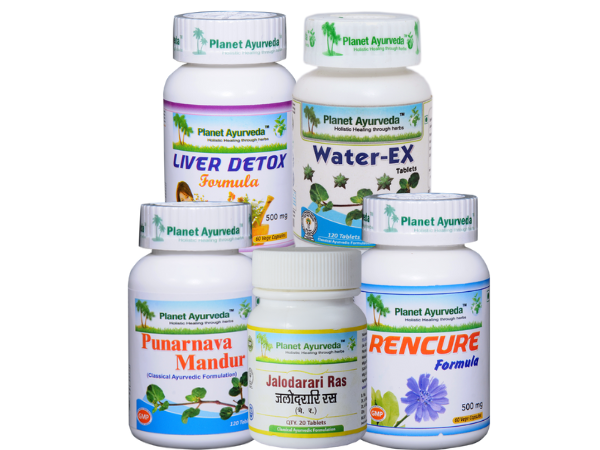Nodosis Side Effects & Safe Alternatives Of Nodosis In Ayurveda
Abstract
Kidneys are a pair of bean shaped organs on either side of your spine present below your ribs and behind your belly. Each kidney is about 4-5 inches and is approximately the size of a fist. Kidneys work towards filtering your blood. They remove the body waste, control the body fluid balance and maintain the electrolyte balance of the body. Kidney disease not only affects your body’s ability to clean the blood but also affects the overall process of removal of extra water from the blood and blood pressure. In this article, we will take a look at modern treatments of kidney disease, use of nodosis in kidney disease, nodosis side effects and safe alternatives of nodosis in Ayurveda.
Introduction – Kidney Disease
Chronic kidney disease includes conditions that lead to the gradual loss of kidney function. These conditions affect the kidney’s ability to filter waste products and excess fluids out of the body. When the kidneys are damaged, waste products and fluids can get accumulated in the body. This often leads to the swelling in the ankles, nausea, weakness and breathlessness. When this condition remains untreated, it most commonly leads to kidney failure where kidneys eventually stop working which leads to fluid buildup in the body.

Different types of kidney diseases are
- Acute Kidney disease
- Chronic kidney disease
- Kidney disease
- Glomerulonephritis
- Polycystic kidney disease
- Urinary tract infections
Symptoms
Kidney disease usually doesn’t show visible symptoms and can go unnoticed from long periods of time. Some of the symptoms that may indicate a kidney disease are:
- Fatigue
- Poor appetite
- Swollen feet and ankles
- Puffiness around eyes
- Frequent urination
Some of the severe and serious symptoms include:
- Nausea
- Vomiting
- Loss of appetite
- Fluctuation in urine output
- Fluid retention
- Anemia
- Rise in potassium levels
Modern Treatment Options for Kidney Disease
Treatment for kidney disease in modern medicine is limited and majorly focuses on the underlying cause of the disease. The goal is to Along with the underlying issue such as cholesterol, blood pressure etc, some of the below mentioned methods are used:
- Drugs and medication: Various drugs and medications are used to manage kidney disease and provide a stable life to a kidney patient. Medications to treat anemia, cholesterol levels and blood pressure are commonly used. Sodium bicarbonate is often used to combat the metabolic acidosis that comes with chronic kidney disease and kidney failure.
- Dialysis: Dialysis means artificially removing the waste buildup and extra fluid from the body when kidneys can no longer do this. A machine filters the blood of excess waste and fluid. Haemodialysis and peritoneal dialysis are the two most common types of dialysis technique used these days.
- Kidney transplant: A kidney transplant involves the surgical process of placing a healthy kidney from the donor into the patient’s body. For people who suffer from complete kidney failure, kidney transplant often remains as a last option.
What Is Nodosis?
Nodosis is a prescription tablet that contains 500mg of sodium bicarbonate. It is most commonly used for heartburn, acidity and bloating. Sodium bicarbonate is an alkali that helps neutralize excess amounts of acid in the body.
Role of Sodium bicarbonate (Nodosis) in kidney disease
Healthy kidneys remove excess acid from the body via urine and maintain the right amount of bicarbonate (base) in the blood but when the kidney disease occurs, kidneys become unable to remove acid from the body which eventually leads to metabolic acidosis and the base in the blood is also reduced below the normal level of 22-29mEq/L. Persistently Low levels of bicarbonates in the body can lead to osteoporosis, stunted growth in children, muscle loss and even the increased progression of CKD. To prevent the further deterioration of the condition, Nodosis is used in kidney disease and failure. Sodium bicarbonate is artificially provided from the outside and studies have shown that sodium bicarbonate supplementation in kidney patients can help kidney disease from getting worse, slow down the rate of kidney function and significantly improve vascular endothelial function in patients with CKD.
Side Effects of Sodium Bicarbonate
Studies show there are many benefits of using Nodosis in kidney disease. While there are many benefits of Nodosis, long term usage can result in certain side effects. Some of these are:
- Peripheral pulmonary edema
- Weight gain
- Increased Blood pressure
- Frequent urge to urinate
- Constant fatigue
- Mood swings
- Constant headaches
- Bitter taste in mouth
Long term usage may result in more severe symptoms such as
1. Metabolic side effects
- Metabolic alkalosis
- Hypernatremia
- Hypokalemia
- Munchausen syndrome
- Congestive heart failure
- Renal insufficiency
2. Respiratory side effects
- Suppressed respiratory drive
- Worsened systemic acidosis
3. Nervous side effects
- Tetany
- Intraventricular hemorrhage
- Mental stupor
- Coma
4. Local side effects
- IV site pain
- Cellulitis
- Tissue necrosis
5. Cardiovascular
- Decreased cardiac contractility
- Decreased serum calcium
- Peripheral vasodilation
6. Gastrointestinal
- Gastric rupture
7. Renal side effects
- False proteinuria
Ayurveda Perspective of Kidney Disease
Ayurveda, a 5000 year old system of medicine is majorly based on the balance of the three doshas or three body humors namely known as Vata, Pitta and Kapha. Imbalance in any of the three doshas disrupts the equilibrium of the body and gives rise to ailments. Kidney diseases in ayurveda are called ‘Vrikka Roga’. Vitiation of Vata dosha leads to the impairment in the kidney functions and vitiated kapha dosha leads to the blockage of minute body channels called as strotas in ayurveda. Vitiated pitta leads to the inflammation of the rakthavaha strotas which further affects the kidney functioning. All the three doshas when vitiated leads to chronic kidney disease which worsens over time.
Ayurveda Management of Kidney Disease
Ayurveda treatment is majorly based on balancing the vitiated doshas. The treatment protocol for most kidney diseases is based on the following principles:
- Treating High Pitta : Pitta balancing herbs and diet
- Pitta-Rakta Strotas Dushti Chikitsa : Treating contaminated channels of pitta and blood
- Medovaha Strotas Dushti Chikista :Treating contaminated channels of fat tissue
- Treating Tikshanagni: Treating increased digestive fire
- Vata Anulomana : Balancing the aggravated vata dosha
- Rasayana Chikitsa: Administration of immune modulators and tissue rejuvenative medicines.
Herbs That Are Safer Alternative of Nodosis
Considering the side effects of sodium bicarbonate therapy in kidney disease, it is better to go for nature given alternatives of sodium bicarbonate that are much more safe and free from side effects. Ayurveda mentions various kinds of herbs that help in treating kidney disease and improve overall functioning of the kidney. Some of the herbs that are safe alternatives of nodosis are mentioned below:
1. Punarnava
Punarnava (Boerhavia diffusa) is mentioned in Ayurveda textbooks as one of the best herbs for kidney disorders. This herb is called hogweed and is a diuretic. This herb helps in removal of excess water from the body and helps in micturition. This herb has madhur vipaka, balances Vata and Kapha and mainly focuses on rejuvenation properties of the body.
2. GOKSHURA
Gokshura (Tribulus terrestris) is used to remove kidney stones in ayurveda. It is a natural diuretic and works amazingly well on the Genito – urinary system. It not only provides strength to the urinary system but also regenerates them and prevents dialysis in the longer run. This has madhur rasa and vipaka along with cold potency which is why it has anti-inflammatory properties.
3. VARUN
Varun (Crataeva nurvala) : This herb is called caper in ayurveda and is another excellent herb for kidney failure. This clears the obstruction in the urinary tract and helps remove kidney stones. It helps in reducing the edema that comes with kidney disorders and reduces the excess fluid accumulated due to kidney failure.
4. CHANDAN
Chandan or sandalwood is a cooling herb that pacifies the pitta dosha and has antimicrobial properties which makes it a perfect choice for kidney infections. This herb is Pitta pacifying, has cold, light and dry properties and manages the weakness, fatigue and thirst in kidney disorders.
5. BHUMI AMLA
Bhumi amla (Phyllanthus niruri) is mentioned in ayurveda and is widely used to treat kidney and liver disorders. Bhumi amla has cold potency, bitter and sweet in taste. This herb has anti viral, antihelminthic and laxative properties. It balances out aggravated Vata and pitta dosha and hence manages thirst, cough and cold.
Best Herbal Alternatives to Nodosis By Planet Ayurveda
Planet ayurveda is a GMP certified authentic ayurveda company that manufactures best, 100% pure ayurveda products under the supervision of MD doctors. Planet ayurveda manufactures some of the best herbal alternatives to nodosis in ayurveda. All the formulations made by planet ayurveda re 100% vegetarian formulations which are free from chemicals, preservatives, starch and additives. All the herbs in these formulations are mentioned in ancient ayurveda texts. Revive kidney pack for advance stages is one such combination that has various capsules and powders in the pure herbal form which are nodosis alternative in ayurveda:
- Mutrakrichantak Churna
- Rencure Formula
- Gokshuradi Guggulu
- Punarnava Capsules
- Phyllanthus Niruri
- Saral Ghan Vati
- Nephralka Capsules
- Chandanasav
Product Description
1. Mutrakrichantak churna
Mutrakrichantak churna is a polyherbal formulation that contains various ayurveda herbs. Some of the herbs are Varun (Crataeva nurvala), Bhumi amla (phyllanthus niruri), gokshur(tribulus terrestris), kalmegh(andrographis paniculata). These herbs help in removing the excess water and fluid from the body and maintain healthy kidneys and a healthy urinary system.
DOSAGE: 1 teaspoon with water twice a day.
2. RENCURE FORMULA
Rencure formula is another poly herbal formulation by Planet Ayurveda that has tablets made from herbs that help in kidney health. Some of these herbs are punarnava (boerhavia diffusa), varun (cratevea nurvala), gokshura (tribulus terrestris), palaash ( butea monosperma), kassni (cichorium intybus).Roots and barks of these herbs are used to prepare this formulation which helps in overall kidney health. This formulation is very effective in reducing the toxin load on the kidney and thus helps in kidney disorders.
DOSAGE: 1 capsule twice daily.
3. NEPHRALKA CAPSULES
Nephralka capsules is an extract based formulation made with pure extracts of the following ayurveda herbs Bhumi amla (phyllanthus niruri), mooli satva (raphanus sativus), revandchini (rheum emodi), kalmegh (andrographis paniculata) and punarnava (boerhavia diffusa). These capsules help maintain healthy kidney functions in the body, maintain acid balance in the body and prevent the overload on the kidney.
DOSAGE: 1 capsule twice daily.
4. CHANDANASAVA
Chandanasava by Planet Ayurveda is herbal formulation in the liquid form. This fermented formulation has chandan or sandalwood as the main ingredient among many other herbs.. Chandan or sandalwood is a cooling herb that pacifies the pitta dosha and has antimicrobial properties which makes it a perfect choice for kidney infections. This herb is Pitta pacifying and has cold, light and dry properties and this formulation manages the weakness, fatigue and thirst in kidney disorders.
DOSAGE: 3 tbsp twice daily with equal amounts of water.
5. PHYLLANTHUS NIRURI CAPSULES
Phyllanthus niruri capsules by Planet Ayurveda contain 500 mg of pure extract of phyllanthus niruri or Bhumiamla. This herb has cold potency, bitter and sweet in taste. This herb has anti viral, antihelminthic and laxative properties. It balances out aggravated Vata and pitta dosha and hence manages thirst, cough and cold. This formulation is known to remove all the mala (waste) from the body and is known to retain health while reversing the liver disorders.
DOSAGE: 1 capsule twice daily.
6. GOKSHURADI GUGGUL
Gokshuradi guggul by Planet Ayurveda is a tablet formulation that contains two prime ingredients namely Gokshur (Tribulus terrestris) and guggulu (Commiphora mukul). Gokshura (Tribulus terrestris) is used to remove kidney stones in ayurveda. It is a natural diuretic and works amazingly well on the genitourinary system. It not only provides strength to the urinary system but also regenerates them and prevents dialysis in the longer run. This has madhur rasa and vipaka along with cold potency which is why this formulation has anti-inflammatory properties.
DOSAGE: 2 tablets twice daily.
7. PUNARNAVA CAPSULES
Punarnava Capsules by Planet Ayurveda Are prepared by using 500 mg of pure standardized extract of the herb Punarnava (Boerhavia diffusa). Punarnava (Boerhavia diffusa) is mentioned in Ayurveda textbooks as one of the best herbs for kidney disorders. This herb is called hogweed and is a diuretic. This herb helps in removal of excess water from the body and helps in micturition. This herb has madhur vipaka, balances Vata and Kapha and this formulation mainly focuses on rejuvenation properties of the body.
DOSAGE: 1 capsule twice daily.
8. SARAL GHAN VATI
Saral Ghan vati by Planet Ayurveda is tablet preparation that contains 500mg of pure standardized extract of the herb Saral (Pinus roxburghii). This herb is found in northern India and has a large amount of taxifolin in it. This herb supports healthy kidney function and exhibits a specific renoprotective activity. This herb has bitter, sweet and diuretic properties which makes this formulation a perfect choice for kidney disorders.
DOSAGE: 2 tablets twice daily.
CONCLUSION
Every person is born with two kidneys and to maintain the overall body health, it is very important to have good kidney health. While we have many chemical solutions in modern medical science, there are equally beneficially solutions available in ayurveda that are free from side effects and are 100% pure. All these herbs taken in pure form along with the correct diet and lifestyle measures can definitely help in treating kidney diseases and promote the overall kidney health in everybody.






